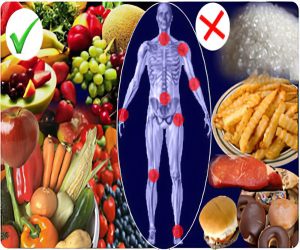Manage joint pain through smart dietary choices and enjoy a pain-free life!
Arthritis is a common chronic condition that affects 32.5 million people in the US (1). While there is no way to cure it, an arthritis diet may help alleviate its symptoms. Studies found that several dietary factors play a crucial role in both arthritis management and triggering inflammatory markers in the body, leading to the onset of the condition (2). Therefore, modifying your diet and knowing the foods to eat and avoid may improve your overall health and help manage joint pain. This article explores the connection between diet and arthritis, foods to eat and avoid in an arthritis diet, and other related aspects. Take a look.
 At A Glance: Arthritis Diet
At A Glance: Arthritis Diet- Principle: Emphasizes consuming anti-inflammatory foods to manage arthritis symptoms.
- Purpose: To reduce pain, swelling, and inflammation caused by arthritis.
- Who It Is For: People with arthritis or susceptible to it.
- Duration: Long-term
- Who Should Avoid: Anyone with food intolerance or allergies.
- Cons: May cause nutritional and vitamin deficiencies.
In This Article
What Is An Arthritis Diet?
An arthritis diet is an eating style or pattern that helps manage the symptoms of arthritis, reduce its risk, and improve joint health. Research suggests that medically supervised dietary intervention has the potential to work as a complementary therapy and may help manage the symptoms of arthritis better (3).
A diet for arthritis focuses on incorporating foods rich in anti-inflammatory properties and essential nutrients that support joint function. It eliminates foods that may further exacerbate the inflammatory markers in the body and increase joint pain in people with arthritis and those at risk of developing it.
The primary goal of an arthritis diet is to reduce inflammation, alleviate pain and stiffness, increase mobility, and promote overall well-being. It typically emphasizes consuming whole grains and nutrient-rich foods like fruits, vegetables, lean proteins, and healthy fats while minimizing or eliminating processed foods, sugar, and certain fats that can contribute to inflammation.
While the role of specific foods, nutrients, and dietary patterns in arthritis management is still debatable, there is no denying that foods may play a protective role. Let’s understand how they may help.
Benefits Of An Arthritis Diet
1. May Help Reduce Inflammation
An arthritis diet may help lower chronic inflammation in the body, which is one of the key causes of arthritis-related joint pain. Incorporating certain food items like walnuts, ginger, and garlic may reduce inflammation and lower the rate of bone destruction (4), (5), (6). However, further studies are required to prove their effectiveness.
2. May Help Relieve Symptomatic Pain
Individuals often experience a reduction in arthritis-related pain after making dietary changes, leading to improved mobility and comfort. In a research survey conducted on 217 patients with rheumatoid arthritisi , 24% of the participants reported that food affected their symptoms, and 15% reported improvement in symptoms after making dietary changes. Researchers found that blueberries and spinach were the foods that improved their symptoms (7).
3. May Improve Joint Health
Incorporating food like berries, grapes, walnuts, and spinach in the diet, which are rich in antioxidants, vitamins, and minerals, supports joint health, prevents cartilage degradation, and may slow down the progression of arthritis (4),(8),(9), (10).
4. May Help With Weight Management
A well-balanced arthritis diet involves consuming healthy food like fruits, vegetables, and lean meat and eliminating processed food, so it may help maintain a healthy weight. This may reduce the strain on the joints and potentially help minimize pain.
5. May Improve Quality Of Life
Improved joint function and mobility with reduced pain help individuals engage in daily activities and enjoy a more active lifestyle, improving their quality of life.
There are many potential health benefits of an arthritis diet, but the question is how this diet works on your body. Check the below section to know more!
How Does Arthritis Diet Work?
The arthritis diet works by eliminating processed food and by:
- Emphasizing the consumption of food with anti-inflammatory properties and antioxidants.
- Eliminating or limiting the consumption of foods known to trigger inflammation, such as processed foods, sugary beverages, and foods high in saturated fats, such as processed meat.
- Striking a balance between fats and nutrients, to combat oxidative stress and reduce inflammation.
The arthritis diet is all about consuming a well-balanced diet. While there is no one-size-fits-all approach to this diet, it’s crucial to work with a registered dietitian to understand which foods relieve and trigger your symptoms. So keep scrolling to explore the lists of foods to eat and avoid if you have arthritis.
Foods To Avoid If You Have Arthritis
Certain foods are best to avoid on an arthritis diet due to their potential to exacerbate inflammation, joint pain, and other symptoms of arthritis. Here’s a list of the foods to limit or avoid on an arthritis diet:
1. Processed Foods: Processed foods, like sugary snacks and fast food, often contain high levels of trans fats and saturated fats, which may cause inflammation and weight gain. Also, consuming sugary drinks like soda may cause weight gain and strain your joints (7), (11).
2. Red And Processed Meats: Meat is high in saturated fats, which may trigger inflammation and worsen symptoms of arthritis (12).
3. Highly Processed Grains: Refined grains and their products like white bread, biscuits, cakes, and wheat products have a high glycemic index, potentially increasing inflammation (13).
4. Alcohol: Animal studies found that excessive alcohol consumption may affect the joints and may increase the risk of developing arthritis (14). However, more human studies are required to prove this claim.
5. Salt: High-sodium diets can contribute to inflammation and exacerbate swelling in arthritic joints (15).
Foods That Help Manage Arthritis Inflammation
Here’s a list of food items that can help manage arthritis symptoms and suppress inflammation:
1. Fatty Fish: Mackerel, salmon, sardines, and trout are rich in omega-3 fatty acids, which have potent anti-inflammatory effects and prevent the onset of arthritis (16).
A study involving 176 participants with rheumatoid arthritis showed that those who consumed fish more than twice a month had lower disease activity scores compared to those who ate fish less frequently (17).
2. Berries: Blueberries, strawberries, and other berries contain antioxidants like anthocyanins (18). These antioxidants help combat inflammation and protect joint tissues.
They also help neutralize free radicals. A study found that consuming 40 grams of freeze-dried blueberry powder daily for 4 months improved pain, stiffness, gait performance, and mobility in people with knee osteoarthritisi (19).
3. Leafy Greens: Spinach, kale, and other leafy greens are high in vitamins, minerals, and antioxidants that support joint health.
Spinach contains antioxidants like kaempferol and fibers that may help relieve inflammation associated with rheumatoid arthritis and osteoarthritis (8).
4. Nuts And Seeds: Walnuts, flaxseeds, and chia seeds are good sources of omega-3 fats and fiber, which may help reduce inflammation and ease arthritis symptoms (20),(21).
Research suggests that frequent consumption of nuts, including walnuts, is associated with lower amounts of inflammatory biomarkers in the body (22).
5. Spices: Ginger, garlic, cinnamon, turmeric, and saffron have anti-inflammatory properties. They inhibit the activation of enzymes, like cyclooxygenase, and specific proinflammatory signaling pathways to reduce joint inflammation and pain (23).
6. Olive Oil: Extra virgin olive oil has anti-inflammatory properties. It contains antioxidants and monounsaturated fatsi , which help reduce inflammation.
An animal study found that consumption of extra virgin olive oil for six weeks may stop the development and progression of arthritis and reduce inflammation, swelling, and cartilage destruction (24).
7. Whole Grains: Whole grains like brown rice, quinoa, and oats may help maintain a healthy weight and reduce inflammation, as they are rich in fiber and nutrients that support overall health (25).
Research suggests that a higher intake of dietary fiber may help lower inflammation and improve the quality of life of patients with rheumatoid arthritis (26).
8. Beans And Legumes: Lentils, red kidney beans, pinto beans, chickpeas, and other legumes are rich in antioxidants, fiber, and protein, which can help with weight management and inflammation control (26), (27).
9. Low-Fat Dairy: Low-fat yogurt and milk provide calcium and vitamin D for supporting strong bones. They may help prevent the onset of knee osteoarthritis in women (28).
 Pro Tip
Pro TipYour body functions well when you consume a wide range of healthy and nutritious foods. The key is to include foods high in antioxidants in your diet. It’s always better to work with your doctor and a registered dietitian. You may try the following dietary approaches to improve your symptoms.
Mediterranean Diet For Arthritis
The Mediterranean diet is renowned for its numerous health benefits and is a promising approach to managing arthritis. It emphasizes consuming fresh fruits and vegetables, whole grains, lean proteins, poultry, beans, fatty fish, and healthy fats like olive oil, which provide anti-inflammatory nutrients and antioxidants.
Studies suggest that the Mediterranean diet may help reduce inflammation and increase physical function in people with rheumatoid arthritis, making it a natural ally for those seeking relief from joint pain and stiffness (29), (30).
The Mediterranean diet has many other health benefits, such as it reduces the risk of heart disease, diabetes, dyslipidemia, and neurodegenerative diseases (31).
Anti-Inflammatory Diet For Arthritis
The anti-inflammatory diet is an effective dietary strategy for managing arthritis and combating chronic pain, stiffness, and inflammation associated with this condition (3). It is more like an eating style that prioritizes nutrient-dense and antioxidant-rich fruits and vegetables, whole grains, and healthy fats like omega-3 fats (found in fatty fish), nuts, seeds, and olive oil, which may help suppress inflammation and alleviate arthritis symptoms (32).
Conversely, it limits or restricts the intake of processed foods, sugary drinks, red meat, and saturated fats, which are considered pro-inflammatory and may aggravate inflammation.
By adhering to anti-inflammatory diets (like the Mediterranean diet and DASH diet), individuals with arthritis may enhance their quality of life and overall well-being.
However, always consult a doctor and a registered dietitian for personalized dietary recommendations tailored to your nutritional needs.
Apart from dietary approaches, taking supplements has also shown promising results in arthritis management. In the next section, let’s understand whether supplementing your anti-inflammatory arthritis diet can provide added benefits and address specific nutritional needs or not.
Should You Take Supplements On An Arthritis Diet?
Generally, a well-balanced diet provides all the nutrients to the body so there is no need for supplements. However, supplements may benefit you if you have a poor appetite or a restricted diet. Supplements can address specific dietary gaps and support joint health.
Common supplements for arthritis management include (34):
- Omega-3 fatty acid supplements (fish oil)
- Vitamin D
- Calcium
- Collagen
- Glucosamine and chondroitin
These supplements help alleviate arthritis symptoms. However, do not self-medicate and choose high-quality supplements. Also, consult a doctor before taking supplements and always stick to the recommended dosage to avoid complications.
Here are a few more practical tips for managing the challenges of arthritis.
Other Tips To Manage Your Diet If You Have Arthritis
- Maintain a healthy weight. It reduces stress on the joints, especially the knees, and may help reduce pain.
- Stay hydrated, as it is essential for joint lubrication and maintaining overall health.
- Identify and limit foods that worsen arthritis symptoms based on personal sensitivities.
- High stress can exacerbate arthritis symptoms. Hence, practice stress-reduction techniques like meditation or yoga.
- Track your diet and symptoms by maintaining a food diary. This will help identify trigger foods and improve your dietary choices.
- Do not eliminate major food groups (like dairy) without consulting your doctor. It may increase the risk of nutrient deficiencies.
- Stay updated on the latest research and dietary recommendations for arthritis management.
The Final Word
Following an arthritis-friendly diet can be a transformative step toward managing joint pain, reducing inflammation, and enhancing overall quality of life. By embracing a diet rich in anti-inflammatory foods, antioxidants, and essential nutrients, individuals with arthritis can empower themselves to take charge of their health. While no single diet can cure arthritis, the right dietary approach can complement medical treatments and significantly enhance our quality of life. Remember that dietary choices are personal, and your diet plan may vary depending on the type of arthritis and the severity of your condition. Therefore, consulting a healthcare professional or registered dietitian for personalized guidance is paramount.
Frequently Asked Questions
What is the duration of an arthritis diet?
It is generally accepted as a long-term diet aimed at managing symptoms and reducing inflammation, so it may even require a lifelong commitment for some individuals.
Is rice OK for arthritis?
You may consume brown rice in moderation and only if suggested by an RDN. White rice or refined carbs may trigger inflammation and worsen your symptoms. Therefore, it’s best to avoid it.
Is milk bad for arthritis?
Milk and dairy products are not generally bad for arthritis and can be a good source of vitamin D and calcium. However, it may trigger inflammation in some individuals. Therefore, consult a registered dietitian before including milk and other dairy products in your diet.
Is curd good for arthritis?
Yes, curd can be included in the diet as it is a good source of calcium and probiotics that support bone health and digestive functions. However, if you are dairy-sensitive or lactose-intolerant, go for dairy-free curd or yogurt.
Is lemon water good for arthritis?
Yes, generally lemon water is hydrating and provides vitamin C, which is an antioxidant that may help reduce inflammation.
What is the best breakfast for arthritis?
The best breakfast options for people with arthritis are oatmeal, greek yogurt, nuts and seeds, berries, and green tea. These are loaded with fiber and antioxidants and have anti-inflammatory properties.
Key Takeaways
- The arthritis diet is a dietary approach designed to manage arthritis symptoms and reduce inflammation and joint pain.
- It emphasizes the consumption of anti-inflammatory and antioxidant-rich foods like whole grains, fruits, leafy green vegetables, nuts, fish, olive oil, and seeds.
- This diet strictly restricts the consumption of refined carbohydrates, processed food, and sugary beverages.
- The Mediterranean diet and the anti-inflammatory diet are known to be beneficial for people with arthritis.
- Taking supplements to support arthritis may also help cover nutritional gaps. However, take them after consulting with a diet




